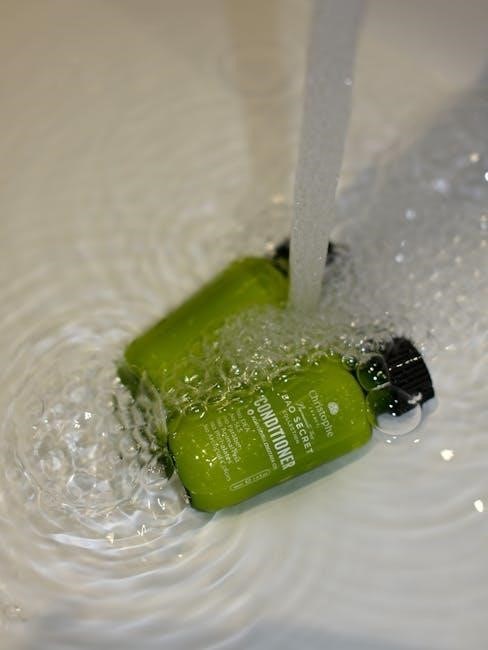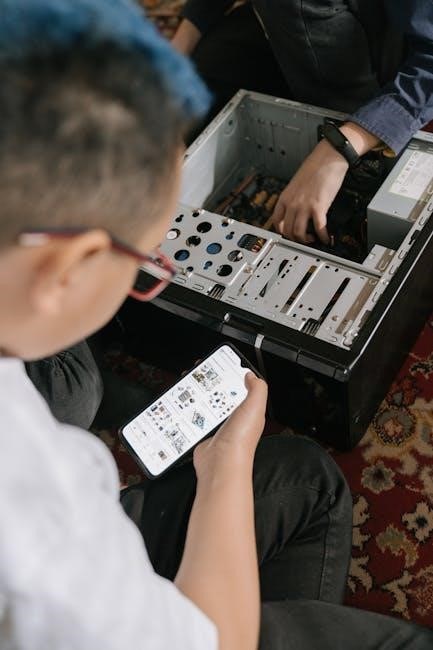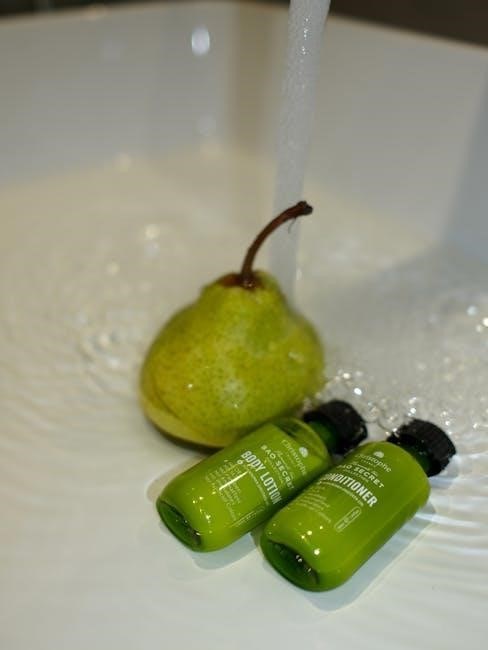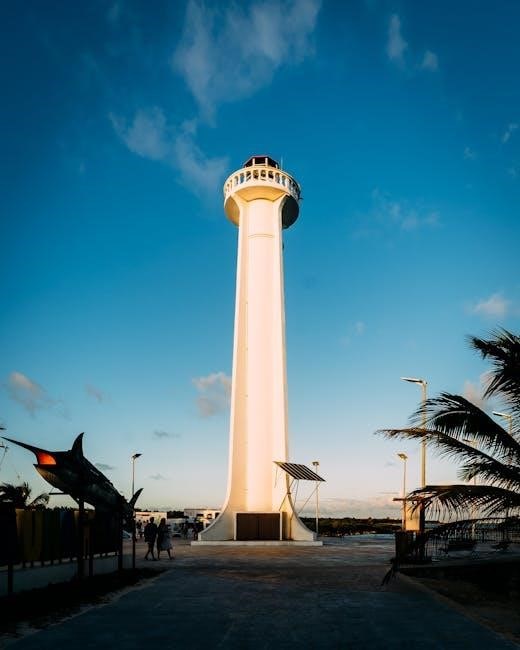Mitsubishi air conditioners are reliable, but issues like cooling problems, power outages, or blinking lights may arise․ This guide helps diagnose and resolve common issues efficiently․
Common Issues with Mitsubishi Air Conditioners
Mitsubishi air conditioners are known for their reliability, but common issues include poor cooling performance, frequent on/off cycles, and indoor unit malfunction․ Remote control and power issues are also prevalent, along with thermostat problems․
The System Isn’t Cooling the Space
If your Mitsubishi air conditioner isn’t cooling, check for airflow blockages like dirty filters or closed vents․ Ensure the thermostat is set correctly and remote control functions are working․ A refrigerant leak or condenser issues could also cause poor cooling․ Verify that all electrical connections are stable and error codes are not displayed․ If issues persist, it may indicate a compressor failure or sensor malfunction, requiring professional assistance․ Regular maintenance can prevent these problems and ensure optimal performance․
The Air Conditioner Keeps Turning On and Off
If your Mitsubishi air conditioner cycles frequently, check for power supply issues such as unstable voltage or tripped circuit breakers․ Faulty thermostat sensors or pressure sensors may also cause this issue․ Ensure the air filters are clean and not obstructing airflow․ A dirty condenser or blocked drain could trigger the system to shut off repeatedly․ Additionally, error codes like 5101 or 5110 might indicate sensor faults․ If the problem persists, consult a technician to inspect for internal component failures or electrical connections․ Addressing these issues promptly can prevent further damage and restore normal operation․
The Indoor Unit Isn’t Turning On
If the indoor unit fails to start, first check the power supply to ensure it is properly connected and that circuit breakers or fuses haven’t tripped․ Verify that the remote control is functioning correctly, with fresh batteries and no signal obstruction․ Ensure the thermostat is set to the correct mode and temperature․ Inspect for internal component failures such as faulty capacitors or relays․ If issues persist, consult a professional to diagnose and repair any electrical or system malfunctions․ Addressing these problems promptly can restore functionality and prevent further complications․
Remote Control Problems
Remote control issues can hinder operation of your Mitsubishi air conditioner․ Check if the batteries are weak or improperly installed․ Ensure there are no obstructions blocking the infrared signal between the remote and the indoor unit․ Verify that the remote control is paired correctly with the system․ If the issue persists, inspect the receiver sensor on the indoor unit for dirt or damage․ In advanced cases, the remote’s PCB (Printed Circuit Board) or infrared transmitter may be faulty․ Replace the remote or consult a professional if internal components are malfunctioning․ Addressing these problems quickly ensures seamless system control and optimal performance․
Power Issues
Power issues are common and can prevent your Mitsubishi air conditioner from functioning properly․ First, check if the circuit breaker has tripped or if a fuse has blown in your electrical panel․ Ensure the unit is properly plugged into a working outlet․ Loose or damaged electrical connections can also cause power failures․ Verify that the power cord is intact and securely connected to both the unit and the outlet․ If the issue persists, consult a professional to inspect the electrical system․ Addressing power problems promptly ensures your air conditioner operates safely and efficiently, avoiding further complications or potential damage to internal components․
Thermostat Issues

Thermostat issues can disrupt your Mitsubishi air conditioner’s performance․ Ensure the thermostat is set to the correct mode and temperature․ If it’s not responding, check the batteries or wiring connections․ A faulty temperature sensor may cause inaccurate readings, leading to uneven cooling․ If the thermostat is programmable, verify the settings or reset it․ For smart thermostats, ensure proper pairing with the air conditioner․ If problems persist, consider replacing the thermostat or consulting a technician․ Proper thermostat function is crucial for maintaining consistent cooling and energy efficiency in your Mitsubishi system, so addressing these issues promptly is essential for optimal performance․

Specific Problems and Their Solutions
This section delves into resolving unique issues like blinking lights, water leaks, and noise․ Each problem is addressed with practical solutions to restore your AC’s efficiency quickly․
Mitsubishi AC Unit Blinking Lights
Blinking lights on your Mitsubishi AC unit indicate specific error codes․ For instance, a 4-digit code like 4255 signifies an outdoor unit fan error, while 5101 points to a temperature sensor fault․ These codes are essential for diagnosing issues accurately․ Regularly checking the user manual or manufacturer’s guide can help you understand the meaning behind each code․ If the issue persists, consulting a professional is recommended to avoid further complications․ Addressing these blinking light errors promptly ensures optimal performance and extends the lifespan of your air conditioner․
Mitsubishi Mini Split Leaking Water
A leaking Mitsubishi mini split can be caused by improper installation or blocked drainage systems․ Ensure the drain hose is clear and correctly positioned․ If the issue persists, check for refrigerant leaks, as they can cause excess condensation․ Regular maintenance, such as cleaning the air filters, helps prevent water accumulation․ If the problem is due to a damaged condensate pump, replacing it may be necessary․ Addressing this issue promptly prevents mold growth and ensures efficient cooling․ Always refer to the user manual for specific guidance or consult a technician for complex repairs․
Noisy Operation of the Air Conditioner
Noisy operation in Mitsubishi air conditioners can stem from loose internal components, dirty filters, or improper installation․ Regularly cleaning the air filters and ensuring proper airflow can reduce noise․ If the unit vibrates excessively, check for loose screws or imbalanced mounting․ In some cases, refrigerant leaks or faulty compressors may cause unusual sounds․ Insulating the outdoor unit or placing it on a vibration-reducing pad can also minimize noise․ If the issue persists, inspect the fan motor or compressor for wear and tear․ Addressing these problems early prevents further damage and ensures quiet, efficient operation․ Always consult the user manual or contact a technician for complex repairs․
Inadequate Cooling Performance
Inadequate cooling performance in Mitsubishi air conditioners can result from several factors․ Dirty or clogged air filters reduce airflow, preventing the system from cooling effectively․ Blocked vents or poor airflow distribution can also contribute to insufficient cooling․ Additionally, low refrigerant levels due to leaks or improper installation may cause the system to underperform․ Inspecting and cleaning filters regularly can improve performance․ Ensuring proper vent alignment and checking for refrigerant leaks are crucial steps․ If the issue persists, inspect the condenser for dirt or damage, as a malfunctioning condenser can significantly reduce cooling efficiency․ Addressing these issues promptly ensures optimal performance and comfort․ Always consult a technician for complex repairs․
Compressor or Condenser Failures

Compressor or condenser failures are critical issues that can cause Mitsubishi air conditioners to malfunction․ The compressor, responsible for circulating refrigerant, may fail due to overheating, electrical faults, or internal damage․ A faulty condenser, which dissipates heat, can also lead to system shutdowns․ Symptoms include reduced cooling performance, frequent on-off cycling, or complete system failure․ Refrigerant leaks or blockages in the condenser coils can exacerbate these problems․ Diagnosing these issues often requires specialized tools and expertise․ If left unaddressed, compressor or condenser failures can lead to irreversible damage․ In such cases, professional intervention is essential to repair or replace the faulty components and restore system functionality․

Advanced Troubleshooting Steps
Advanced troubleshooting involves checking error codes, diagnosing refrigerant leaks, and assessing compressor damage․ These steps require technical expertise and specialized tools for accurate issue identification and resolution․
Checking Error Codes on Mitsubishi Air Conditioners
Mitsubishi air conditioners display error codes to indicate specific issues․ These codes, such as 4255, 5101, or 5110, correspond to problems like fan errors or sensor faults․ By referencing the user manual or manufacturer’s guide, you can identify the cause of the error․ For instance, error code 5101 typically signifies a temperature sensor fault, while 5110 relates to a return air thermistor issue․ Understanding these codes allows for targeted troubleshooting, ensuring efficient resolution of the problem․ Regularly checking and addressing error codes can prevent minor issues from escalating into major repairs․
Understanding Common Error Codes (e․g․, 4255, 5101, 5102, 5110)
Mitsubishi air conditioners use specific error codes to indicate issues․ Code 4255 often relates to outdoor unit fan errors, while 5101 signifies a temperature sensor fault․ Code 5102 points to a return air thermistor issue, and 5110 indicates a problem with the same thermistor․ These codes help pinpoint specific malfunctions, guiding users or technicians toward the right solution․ Referencing the user manual or Mitsubishi’s official documentation is essential for accurate diagnosis․ Understanding these codes ensures timely repairs and prevents further damage․ Regular checks and addressing these codes can enhance system efficiency and extend the unit’s lifespan․
Identifying Refrigerant Leaks
Refrigerant leaks are a common issue in Mitsubishi air conditioners, leading to reduced cooling performance and potential system damage․ Signs include hissing sounds, ice buildup on the evaporator, or a decrease in cooling efficiency․ To identify leaks, inspect the system for visible damage, such as corroded pipes or loose connections․ Using a refrigerant leak detector can help locate the source․ Addressing leaks promptly is crucial, as they can cause further damage to the compressor or condenser․ Always contact a certified technician for repairs, as handling refrigerants requires proper training and equipment to ensure safety and compliance with regulations․ Regular maintenance can help prevent such issues․
Diagnosing Damaged Compressors
A damaged compressor can cause significant issues in Mitsubishi air conditioners, such as random on/off cycles or reduced cooling performance․ Signs of a faulty compressor include unusual noises, increased energy bills, or warm air circulation․ If the compressor fails, the system may shut down entirely․ While some issues can be resolved by checking power supply or error codes, compressor damage often requires professional intervention․ A technician will inspect for internal faults or refrigerant leaks․ Addressing compressor problems promptly is essential to prevent further system damage and ensure optimal performance․ Regular maintenance can help identify potential issues before they escalate, saving time and money; Always consult a certified technician for complex repairs․
Consult a professional for complex issues like refrigerant leaks, compressor failures, or persistent error codes․ Experts ensure safe and effective repairs, preventing further system damage․ Major problems such as refrigerant leaks, damaged compressors, or persistent error codes require professional intervention․ These issues are complex and beyond DIY troubleshooting․ Experts have the tools and knowledge to handle such cases safely and effectively, ensuring the system operates optimally․ Attempting to fix these issues without proper expertise can lead to further damage or safety hazards․ Always consult a certified technician for these critical repairs to maintain your Mitsubishi air conditioner’s performance and longevity․ Professional assistance is essential for resolving these major issues promptly and correctly․ Consulting authorized Mitsubishi dealers or certified technicians is crucial for resolving complex issues․ They provide expert diagnosis and repair, ensuring compliance with manufacturer standards․ Dealers have access to genuine parts and advanced tools, guaranteeing effective solutions․ Regular maintenance by professionals can prevent costly repairs and extend the system’s lifespan․ For error codes like 4255, 5101, or 5110, technicians can accurately interpret and fix the problems․ Their expertise ensures your air conditioner operates efficiently and safely, maintaining optimal performance and reliability over time․
When to Call a Professional
Major Issues Requiring Expert Assistance

Consulting Dealers or Technicians
